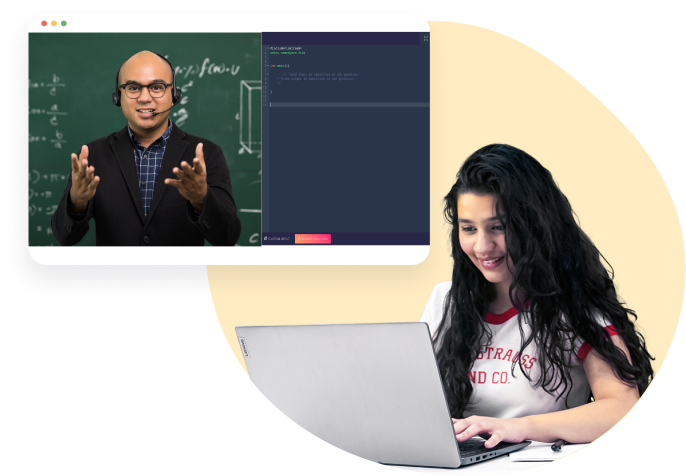Zero to Master Program
Kubernetes
Kubernetes is a powerful container orchestration platform that automates deployment, scaling, and management of containerized applications. In a DevOps program, Kubernetes enhances continuous integration and continuous deployment (CI/CD) pipelines by providing a robust infrastructure for managing microservices. It allows for seamless scaling of applications based on demand, ensuring high availability and fault tolerance. Kubernetes integrates with various DevOps tools like Jenkins, GitLab, and Prometheus to streamline workflows. It supports infrastructure as code, enabling version control and consistency across environments. With its declarative configuration model, Kubernetes simplifies application updates and rollbacks. Overall, Kubernetes boosts efficiency, reliability, and scalability in DevOps practices.
4.8
30K+ Learners enrolled
This is where you embark on an amazing journey!
Most flexible program in the industry

Freedom to learn
Watch classes any time at your convenience

Cheat days
Catch up on the course when life is calling you elsewhere

Features that keep you going

A structured curriculum that makes learning easy

Practice code problems of varying difficulty

Engagement coach to keep you motivated

Compile & run in an integrated coding environment

Get doubts resolved in 30 mins
1:1 sessions over voice call & chat with our
skilled teaching assistants

Industry leading mentors to help you grow

1:1 Mock interviews with resume and career guidance

Structured feedback to make you better

Get a chance to be referred to your mentors’ company

Experience a seamless job switch
with hiring assistance
Skill-based hiring across all levels of experience

The results

7000+
Transitions to product companies

250+
Trusted placement partners
Frequently asked but seldom read questions
Yes, this course is entirely offline, and we offer some courses online as well.
Basic knowledge of Linux command line, containers (such as Docker), and networking concepts is recommended. Some familiarity with cloud platforms can be beneficial but is not mandatory.
Yes, students typically have access to course materials for a certain period after the course ends, allowing them to review and revisit the content as needed.
Submissions are evaluated based on criteria such as correctness,
completeness, critical thinking, and adherence to instructions, typically
using rubrics or grading guidelines provided by the instructor.
Meet the faculty legends that will make you legendary
Praveen has a full stack development experience and professional
instructor and trainer for Flutter,
Data Science, Machine Learning and Python Programming. Over the
course of his career he has developed a skill set in analyzing data
and he hopes to use his experience in teaching and data science to
help other people learn the power of programming,
the ability to analyze data, and the skills needed to present the
data in clear and beautiful visualizations.
He is an expert in JavaScript & React (Front-end) and has worked on
open-source projects like Firebug and Zulip.
He has also served as a GCI (Google Code-In) Mentor with Zulip. In
his previous role as a Software Engineer he has worked for
Goibibo-MMT.
Course curriculum for the curious
-
-Overview of containerization
-
-Introduction to Kubernetes
-
-History and evolution of Kubernetes
-
-Key components and architecture
-
-Kubernetes vs. traditional infrastructure
-
-Setting up a local development environment
-
-Installing Kubernetes on various platforms
-
-Configuring Kubernetes clusters
-
-Understanding kubeadm, kubelet, and kubectl
-
-Cluster setup and validation
-
-Detailed architecture of Kubernetes clusters
-
-Understanding nodes, pods, and namespaces
-
-Master node components
-
-Worker node components
-
-Cluster communication and networking
-
-Deploying applications using pods
-
-Understanding ReplicaSets and Deployments
-
-Managing StatefulSets and DaemonSets
-
-Introduction to Kubernetes networking model
-
-Configuring cluster networking
-
-Understanding Services and Service types
-
-Network policies and ingress controllers
-
-DNS in Kubernetes
-
-Overview of Kubernetes storage concepts
-
-Working with Persistent Volumes and Persistent Volume Claims
-
-Storage Classes and dynamic provisioning
-
-Configuring and managing volume plugins
-
-Backing up and restoring data
-
-Overview of Kubernetes security principles
-
-Securing the cluster and nodes
-
-Role-Based Access Control (RBAC)
-
-Network policies and security contexts
-
-Secret and ConfigMap management
-
-Introduction to Helm
-
-Helm charts and repositories
-
-Installing and managing applications with Helm
-
-Creating custom Helm charts
-
-Helm 3 features and best practices
-
-Overview of Kubernetes monitoring tools
-
-Setting up Prometheus and Grafana
-
-Configuring alerts and dashboards
-
-Kubernetes logging architecture
-
-Centralized logging with Fluentd and Elasticsearch
-
-Horizontal Pod Autoscaler
-
-Vertical Pod Autoscaler
-
-Cluster Autoscaler
-
-Performance tuning and optimization
-
-Resource requests and limits
-
-Integrating Kubernetes with CI/CD pipelines
-
-Using Jenkins, GitLab CI, and other CI/CD tools
-
-Implementing automated deployments
-
-Canary deployments and blue-green deployments
-
-Rollbacks and version control
-
-Custom Resource Definitions (CRDs)
-
-Operators and operator pattern
-
-Kubernetes Federation
-
-Service Mesh with Istio
-
-Multi-cluster management
-
-Kubernetes on AWS (EKS)
-
-Kubernetes on Google Cloud (GKE)
-
-Kubernetes on Azure (AKS)
-
-Hybrid and multi-cloud Kubernetes strategies
-
-Best practices for managing cloud-based Kubernetes






































